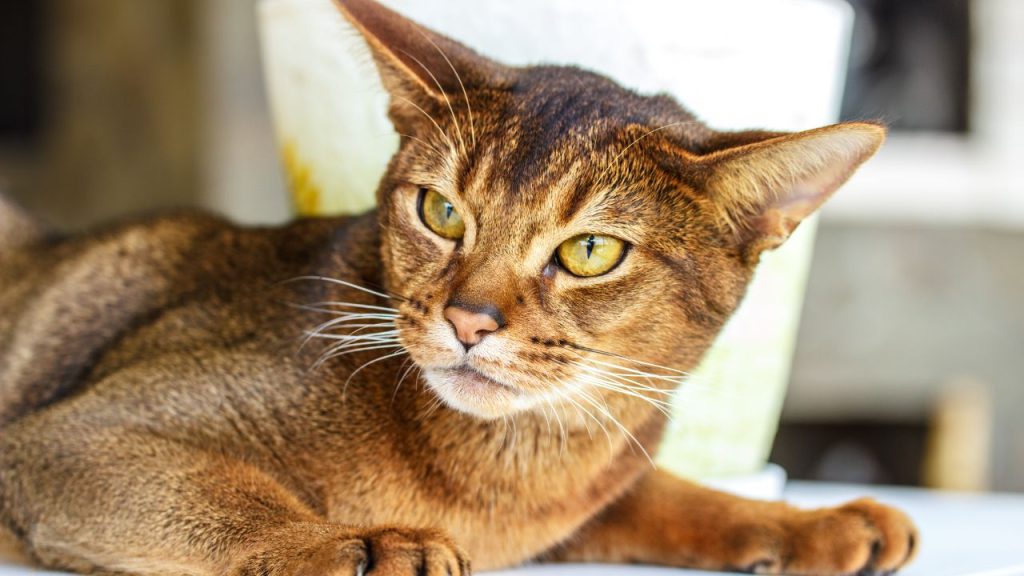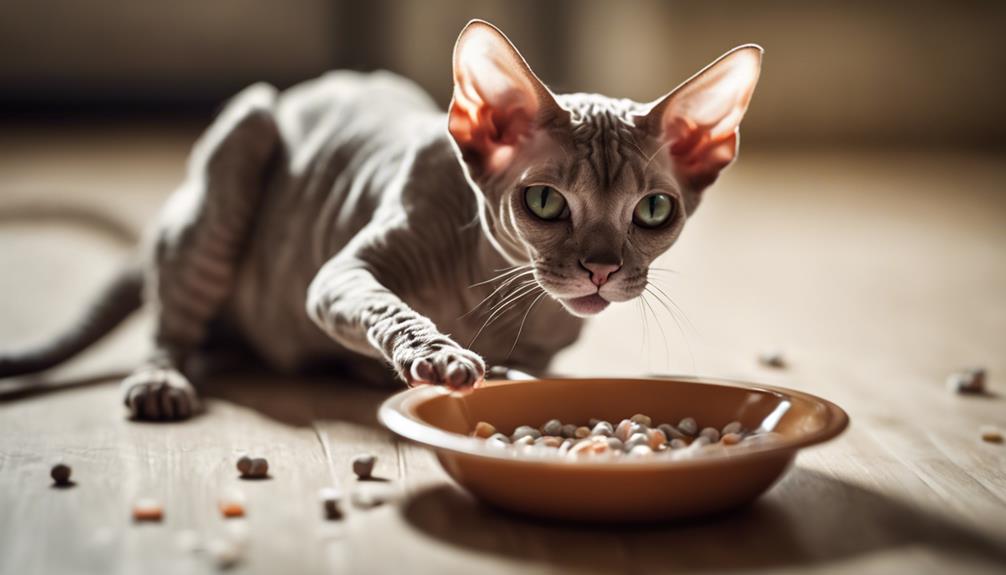As an Abyssinian cat owner, I know firsthand how wonderful and unique this breed can be. However, like any other pet, Abyssinian cats are not immune to health issues. In this article, I will be discussing the common problems that Abyssinian cats may face and how to prevent or treat them.
One of the most common health issues that Abyssinian cats experience is dental disease. Due to their small size, Abyssinians are prone to developing tartar and plaque buildup, which can lead to gum inflammation and tooth decay. Regular brushing and dental checkups with a veterinarian can help prevent dental disease in Abyssinian cats.
Another health issue that Abyssinian cats may experience is progressive retinal degeneration, which can cause blindness. Unfortunately, this condition is genetic and cannot be cured. However, early detection and treatment can help slow down the progression of the disease. It’s important to keep an eye on your Abyssinian cat’s vision and bring them to the vet if you notice any changes or abnormalities.
Health Problems
As an Abyssinian cat owner, I know that my furry friend is prone to certain health issues. Here are some of the most common health problems that Abyssinian cats can face:
Dental Issues
Dental disease is a common problem with Abyssinian cats, but it can be prevented with frequent brushing and periodic dental exams. Brushing a cat’s teeth is not a simple procedure, but your veterinarian can show you the proper technique. Gingivitis is another common dental issue that can cause discomfort and even lead to periodontal disease and tooth loss if left untreated.
Renal Failure
Abyssinian cats are also prone to renal failure. This is a serious condition that can lead to kidney damage or even kidney failure. Symptoms of renal failure include increased thirst and urination, vomiting, and weight loss. If you notice any of these symptoms, it’s important to take your cat to the vet right away.
Hyperthyroidism
Hyperthyroidism is another common health issue in Abyssinian cats. This condition occurs when the thyroid gland produces too much thyroid hormone. Symptoms of hyperthyroidism include weight loss, increased appetite, and hyperactivity. Treatment options include medication, surgery, or radioactive iodine therapy.
Heart Disease
Lastly, Abyssinian cats are also prone to heart disease. This can include conditions such as hypertrophic cardiomyopathy, which causes the walls of the heart to thicken, and dilated cardiomyopathy, which causes the heart to enlarge.
Symptoms of heart disease can include difficulty breathing, coughing, and lethargy. Treatment options can vary depending on the specific condition and severity.
Overall, it’s important to be aware of these common health issues in Abyssinian cats and to take your cat to the vet for regular check-ups and preventative care. By staying on top of your cat’s health, you can help ensure that they live a long and happy life.
Behavioral Problems
As an Abyssinian cat owner, I have come across several behavioral problems that are common in this breed. Here are some of the most common behavioral problems that you may encounter with your Abyssinian cat.
Separation Anxiety
Abyssinian cats are social creatures that love to be around their owners. They can become quite attached to their owners, and this can lead to separation anxiety when they are left alone for extended periods. Symptoms of separation anxiety include excessive meowing, destructive behavior, and inappropriate elimination.
To prevent separation anxiety, it’s important to gradually get your Abyssinian cat used to being alone. Start by leaving your cat alone for short periods and gradually increase the time. Provide your cat with toys and a comfortable place to rest while you’re away.
Aggression
Abyssinian cats are generally friendly and affectionate, but they can become aggressive if they feel threatened or stressed. Aggressive behavior can include biting, scratching, and hissing.
To prevent aggression, it’s important to provide your Abyssinian cat with a safe and secure environment. Avoid exposing your cat to stressful situations and provide plenty of toys and scratching posts to help relieve stress.

Litter Box Problems
Abyssinian cats are generally clean animals that are easy to litter train. However, they can develop litter box problems if their litter box is not kept clean or if they are stressed.
To prevent litter box problems, make sure to clean your cat’s litter box regularly. Provide your cat with a comfortable and private place to use the litter box. If your cat continues to have litter box problems, consult with your veterinarian to rule out any underlying medical conditions.
In conclusion, Abyssinian cats can develop a variety of behavioral problems that can be prevented with proper care and attention. By providing your cat with a safe and comfortable environment, you can help prevent these problems and ensure that your cat is happy and healthy.
Grooming Issues
As an Abyssinian cat owner, I know that grooming is an important part of their care routine. Here are some grooming issues that Abyssinian cats may face.
Hairballs
Abyssinian cats have short hair, but they still shed. Hairballs can be a problem for them, especially if they groom themselves excessively. To prevent hairballs, I make sure to brush my cat regularly. This helps remove loose hair and prevent hairballs from forming. I also give my cat hairball control treats that help reduce hairball formation.
Skin Allergies
Abyssinian cats can be prone to skin allergies. These allergies can be caused by a variety of things, including food, fleas, and pollen. If my cat starts scratching excessively or has red, irritated skin, I take them to the vet to determine the cause of the allergy. To prevent skin allergies, I make sure to keep my cat’s environment clean and free of fleas.
Ear Infections
Abyssinian cats have large ears that can trap dirt and wax. This can lead to ear infections if not cleaned regularly. I clean my cat’s ears once a week with a gentle ear cleaning solution. If my cat shows signs of an ear infection, such as shaking their head or scratching their ears, I take them to the vet for treatment.
In summary, grooming is an important part of caring for an Abyssinian cat. Regular brushing, cleaning of ears, and keeping the environment clean can help prevent hairballs, skin allergies, and ear infections.
Top Takeaways
After researching Abyssinian cats and their health problems, here are the top takeaways that I found:
- Abyssinian cats are generally healthy cats, but they can still be prone to certain health issues.
- Dental disease is a common problem with Abyssinian cats, but it can be prevented with frequent brushing and periodic dental exams.
- Periodontal disease, an infection of the tissues that hold the teeth in place, is also a common issue in Abyssinian cats.
- Abyssinian cats may also be prone to patellar luxation, which is a hereditary tendency to experience dislocation of a kneecap.
- Progressive retinal degeneration is a genetic condition that may occur in Abyssinian cats, which can lead to blindness.
- Abyssinian cats may also be prone to neurological problems that can lead to excessive grooming.
- Kidney failure and pyruvate kinase deficiency (PKD) are also potential health problems that Abyssinian cats may experience.
It’s important to note that not all Abyssinian cats will experience these health problems, and some may never have any issues at all. However, it’s always a good idea to be aware of potential health problems and to take steps to prevent them whenever possible. Regular veterinary check-ups and good dental hygiene can go a long way in keeping your Abyssinian cat healthy and happy.





